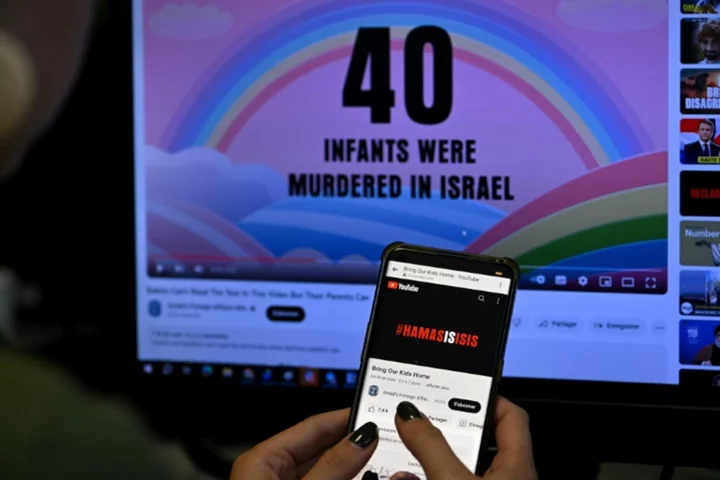Israel is running a hard-hitting online campaign targeting mostly Europeans with shocking images and testimonies from the attacks carried out by Islamist militant group Hamas on October 7.
Dozens of clips of burnt bodies, bereaved families, fast-cuts of screams and sirens, rescue workers and pathologists are featured on the Israeli foreign ministry's official social media channels and in paid advertising campaigns.
The idea is to keep fresh in the minds of the foreign public how Hamas fighters crossed from Gaza into Israel and, according to Israeli officials, killed some 1,400 people, mostly civilians, while also seizing more than 230 hostages.
The online campaign also aims to justify Israel's relentless bombing of Gaza since then, which has killed more than 8,300 people, including over 3,000 children, according to the Hamas-run health ministry.
Some of the videos are graphic: in one clip, a pathologist describes photos of a child's burnt body.
Others are unashamedly emotive. Cartoon unicorns frolic among rainbows before giant capital letters pop up on the screen: "Just as you would do everything for your child, we will do everything to protect ours."
"This is how we communicate in 2023," Emmanuel Nahshon of the Israeli foreign ministry told AFP.
But experts say the campaign risks alienating some audiences.
There has already been some pushback, with Google limiting access to one graphic clip and a gaming firm demanding the ads be removed.
- 1.1 billion views -
Nahshon said he wanted the message to get out to the world that Hamas's atrocities are comparable to those of the Islamic State group, also known as ISIS, who were notorious for publicising their massacres and hostage-taking.
The Israeli videos come with made-for-sharing slogans such as "BringThemHome", "Stand with Israel, Stand with Humanity" or "Hamas=ISIS" even though many scholars reject the comparison between Hamas and Islamic State group jihadists.
Nahshon said the videos had racked up more than one billion views, a claim backed by data from US digital marketing company Semrush, which showed the campaign at that stage had clocked up 1.1 billion views in some 30 countries.
Nahshon said the government had invested "a few hundred thousand dollars" -- though Semrush figures suggested the cost was $8.5 million.
The principal target of the ad campaign is France, home to the largest Jewish and Arab-Muslim communities in Europe, where $4.6 million has been spent.
Germany came next at $2.4 million followed by the United Kingdom, with $1.2 million spent, according to Semrush.
- 'Unbearable images' -
Stephanie Lamy, a specialist in wartime communication strategies, argued that Israel's campaign was pursuing the single goal of legitimising its bombing in Gaza.
"The aim is to justify violence and even to try to secure impunity in the event of a contravention of international law," she said.
Hamas is also waging an online information campaign to strengthen its own case, highlighting Israel's aggression and its toll on innocent Palestinians in Gaza.
But Hamas is designated a terrorist group by the United States and European Union, meaning it is banned from the main social media platforms.
The militant group had been using official channels on the Telegram app to push its message, including graphic videos of Israel's bombing of Gaza and clips of the October 7 attacks shot by some of its fighters.
These channels have been disabled in recent days on Google's Android platform.
Israel's campaign, too, has suffered setbacks.
Google told AFP last week that the clip featuring the burnt body of a child had been made inaccessible to young people and that they had added an explicit content warning.
The maker of the "Angry Birds" game, Finnish firm Rovio, said it had asked its advertising partners to block an Israeli ad after complaints from users on social media.
That still leaves Israel way ahead in the information war in terms of viewing figures.
But experts say any achievements could come at a price.
"Subjecting people to images that are literally unbearable is a risky strategy" for Israel, said communications expert Arnaud Mercier.
"It could be counterproductive with an audience who didn't ask to be exposed to it."
jf-jma-jxb/jh/fz/ami/leg









